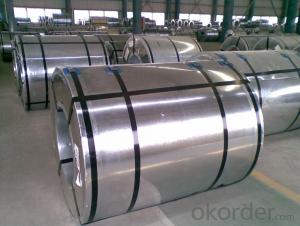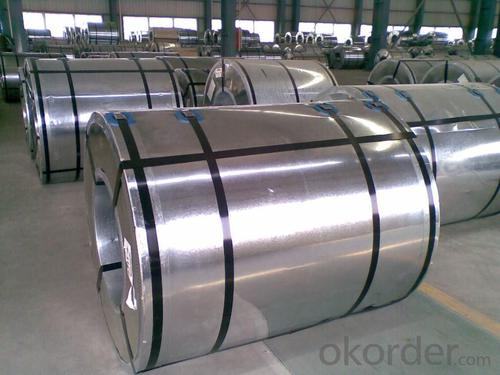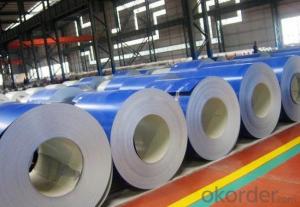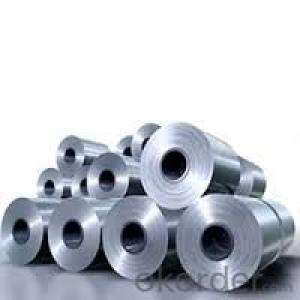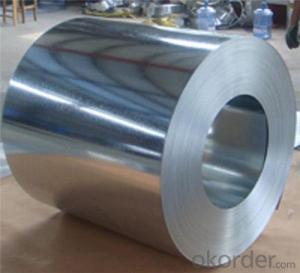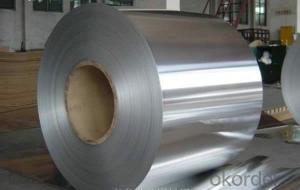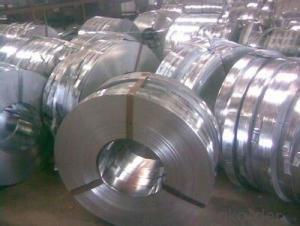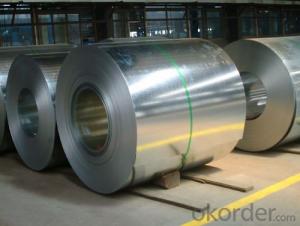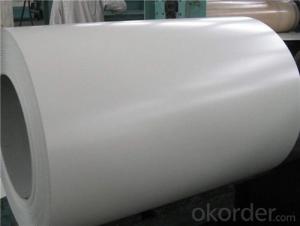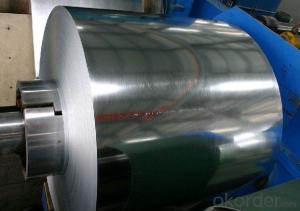Al-Zinc coated steel coil For Construction Roof
- Loading Port:
- Shanghai
- Payment Terms:
- TT OR LC
- Min Order Qty:
- 25 m.t.
- Supply Capability:
- 30000 m.t./month
OKorder Service Pledge
OKorder Financial Service
You Might Also Like
Structure of Al-Zinc coated steel coil
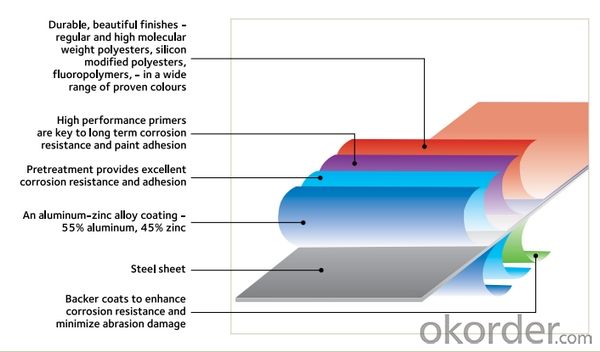
Description of Aluminum Zinc Rolled Coil
The detailed information for the Al-Zinc coated steel coil is as following and it is mainly using for roofing producing, making ceiling grid and all kinds of roll forming structure.
Thickness: 0.20mm to 1.20mm
Width: 914mm, 1000mm, 1200mm, 1219mm and 1250mm, or slit narrow strip according to customer request, can be slit from 20mm to 610mm.
Coil ID: 508mm
Coil weight: 3 tons to 6 tons
Thickness tolerance: +/- 0.02mm or according to customer request.
Main Feature of Al-Zinc coated steel coil
1.Corrosion resistance: It mainly depends on the aluminum protection. When the zinc being worn, the aluminum will form a dense layer of aluminum oxide, resist corrosion material to prevent further corrosion inside.
2. Heat resistance: Aluminum zinc alloy steel sheet has excellent heat resistance, can withstand high temperatures over 300 centigrade, and is similar with aluminized steel high temperature oxidation resistance. It often used in chimney pipes, ovens, fluorescent lighting device and the device cover.
3. Heat reflective: Galvanized steel plate heat-reflective high rate is twice as galvanized steel, often used to make insulation materials.
4. Economy: Because density of 55% AL-Zn is smaller than the density of Zn, so in the same weight and thickness of Galvanized zinc layer, aluminum-zinc steel plate is larger area more than 3% of galvanized steel sheet.
Applications of Al-Zinc coated steel coil
1. Construction and building: roofing; ventilating duct; handrail; partition panel;etc.
2. Electric appliance: refrigerator; washing machine; refrigerator; DVD;etc.
3.Transportation: oil tank; road sign; etc.
4.Agriculture:barn; etc.
5.Others:vending machine; game machine; etc.
Specifications of Al-Zinc coated steel coil
Prepainted galvanized steel coil ( PPGI ) | Prepainted galvalume steel coil ( PPGL ) | |
Standard | JIS G3312 CGCC | J IS G3322 CGLCC |
Valid thickness | 0. 16 ~1. 2 0mm | 0. 16 ~1. 2 0mm |
Coil width | 600~1250mm | 600~1250mm |
Coil ID | 508mm & 610mm | 508mm & 610mm |
Coil weight | 3~5 tons | 3~5 tons |
Coating | 4 0~275 g/m2 | AZ30 to AZ150 |
Paint t hickness , top side | 15~25 microns | 15~25 microns |
P aint t hickness , reverse | 5~7 microns or 15~25 microns | 5~7 microns or 15~25 microns |
Color | any RAL code | any RAL code |
Package | vertical, eye to sky & horizontal | vertical, eye to sky & horizontal |
MOQ | 25 tons | 25 tons |
FAQ of Al-Zinc coated steel coil
We have organized several common questions for our clients,may help you sincerely:
1. What is the minimum order quantity ?
Our MOQ is 50mt for each size. And we will consider to give more discount if you make big order like 1000 tons and more. Further more, the more appropriate payment term your offer the better price we can provide.
2. How long can we receive the product after purchase?
Usually within thirty working days after receiving buyer’s advance payment or LC. We will arrange the factory manufacturing as soon as possible. The cargo readiness usually takes 15-25 days, but the shipment will depend on the vessel situation.
3. How to guarantee the quality of the products?
We have established the international advanced quality management system,every link from raw material to final product we have strict quality test;We resolutely put an end to unqualified products flowing into the market. At the same time, we will provide necessary follow-up service assurance.
- Q: What are the different types of steel coils available?
- There are several different types of steel coils available, each with its own specific properties and uses. 1. Hot Rolled Steel Coils: These coils are produced at high temperatures and are commonly used in applications that require a smooth and polished finish, such as automotive parts, construction materials, and machinery. 2. Cold Rolled Steel Coils: These coils are processed at lower temperatures to improve the surface finish and dimensional accuracy. They are widely used in industries such as automotive, appliances, and electronics, where a high level of precision is required. 3. Galvanized Steel Coils: These coils are coated with a layer of zinc to protect the underlying steel from corrosion. They are commonly used in construction materials, roofing, and automotive parts that are exposed to harsh environmental conditions. 4. Stainless Steel Coils: These coils are made from a combination of iron, chromium, and other elements to provide excellent corrosion resistance and high strength. They are widely used in applications that require hygiene, such as food processing equipment, medical instruments, and kitchen appliances. 5. Electrical Steel Coils: These coils are specifically designed for applications that require magnetic properties, such as transformers, electric motors, and generators. They have low core losses and high permeability to efficiently transfer electrical energy. 6. Pre-painted Steel Coils: These coils are coated with a layer of paint or other protective coatings to enhance their aesthetic appeal and provide additional protection against corrosion. They are commonly used in the construction industry for cladding, roofing, and siding. 7. Tinplate Steel Coils: These coils are coated with a thin layer of tin to prevent corrosion and provide a barrier against moisture and oxygen. They are widely used in the packaging industry for cans, containers, and other food or beverage packaging. These are just a few examples of the different types of steel coils available in the market. Each type has its own unique properties and applications, making them suitable for various industries and purposes.
- Q: I have heard using the BRASS casing is the best thing for an AR-15? Should i just use Brass or Steel?
- Many people have to jam a cleaning rod muzzle end first, using a hammer to bang out steel cased ammo out of an Ar rifle. This has happened to me 3 times and will Never happen again. It said its harder on the extractor, well that is not so but the case will be badly damaged by the extractor and I don't think that is a good thing for any extractor. Any individual pushing steel cased ammo must be selling it...Don't Buy It!!!
- Q: How are steel coils used in the construction of bridges?
- Steel coils are used in the construction of bridges primarily for their strength and durability. They are shaped and welded into various structural components, such as beams and girders, which provide support and stability to the bridge structure. Steel coils also serve as reinforcement in concrete structures, enhancing their load-bearing capacity. Additionally, steel coils are used for manufacturing bridge decks, guardrails, and other essential elements that contribute to the overall strength and longevity of the bridge.
- Q: How do steel coils contribute to the energy sector?
- Steel coils contribute to the energy sector by being a crucial component in the construction and maintenance of power plants, transmission towers, and renewable energy infrastructure. These coils are used to manufacture equipment like turbines, generators, transformers, and pipelines, which are vital for the efficient generation, transmission, and distribution of electricity. Additionally, steel coils are also used in the manufacturing of energy-efficient appliances and vehicles, further promoting sustainability in the energy sector.
- Q: During fatigue testing of any material (especially for steels), why is strain-control mode preferred over stress control mode?
- because metals, like steel, are ductile and will stretch before breaking. Straining the metal is stretching it, stressing the metal is applying a shearing force or bending until there is an actual metal failure. A sheet metal strap 1inch across and 24 gauge metal is commonly used to support metal ducting systems in construction. These have an average strain to failure weight load as high as 16,200 lbs. As reported by the smacna index, they will safely hold 6800 pounds. Of more interest is the screws used to hold the strap to the duct. While they are grade 3, fairly strong, they strain to 1400 pounds when properly installed, and are safely able to support 650 pounds, unless they are overtorqued (stripped) and this quickly drops to 400 pounds and 125 pounds...big difference.
- Q: days. Use your knowledge of the corrosion of steel and aluminum to predict how they would look different after a week exposed to rainy weather. Explain your prediction.
- Steel rusts, aluminum doesn't so the steel can would be rusty and the aluminum can would not.
- Q: bullets are normally made out of lead...are there bullets that are completely steel?? (not plated)
- They will both knock it over, but it depends on how the bullets hit the block. If the steel bullet hits the block at any kind of an angle, it will knock it over because it will enter the block cross grain. If it hits it straight on, it will not have as much resistance as it goes with the grain of the wood. The rubber bullet will have more resistance because it does not pierce the block. The force from the rubber bullet would be the same no matter what angle it comes from.
- Q: How do steel coils contribute to the agricultural industry?
- The agricultural industry relies heavily on steel coils as a crucial component for the production and maintenance of various agricultural machinery and equipment. These coils are primarily used to manufacture farm equipment like tractors, plows, harvesters, and irrigation systems. One of the key benefits of steel coils is their durability and strength, which makes them ideal for agricultural applications. These coils are processed and shaped into different sizes to create robust components that can withstand the demanding conditions and heavy workloads typically associated with farming operations. Steel coils are widely used in constructing tractor frames, ensuring the vehicles' structural integrity and stability. They are also utilized in manufacturing plow blades, providing the necessary strength to effectively cut through the soil and prepare the land for planting. Moreover, steel coils are crucial in creating harvester blades, which enable efficient harvesting and minimize crop damage. In addition to machinery, steel coils play a vital role in the production of irrigation systems, which are essential for agricultural practices. These systems require pipes and tubes that can endure high water pressures and resist corrosion caused by the elements. Steel coils are processed into these pipes and tubes, ensuring their durability and longevity, and thereby facilitating efficient water management and irrigation in fields. Furthermore, steel coils contribute to the agricultural industry by ensuring the secure storage and transportation of agricultural products. They are used in constructing storage silos and grain bins, which provide safe and weather-resistant spaces for storing crops. Steel coils are also utilized in fabricating transportation containers like trailers and trucks, ensuring the safe delivery of agricultural goods from farms to markets. In summary, steel coils have a significant impact on the agricultural industry. Their strength, durability, and versatility make them essential for manufacturing agricultural machinery, irrigation systems, storage facilities, and transportation containers. By providing reliable and efficient equipment, steel coils contribute to increased productivity, improved crop yields, and enhanced overall efficiency in the agricultural sector.
- Q: How are steel coils used in the production of metal buildings?
- Steel coils are an essential component in the production of metal buildings as they are used to create the structural framework and outer cladding. These coils are unrolled and cut into sheets, which are then shaped and formed into various building components such as beams, columns, and panels. The strength and durability of steel make it an ideal material for constructing metal buildings, ensuring they are capable of withstanding harsh weather conditions and providing long-lasting structures.
- Q: What are the challenges in coil leveling for high-strength steel?
- Coil leveling for high-strength steel poses several challenges that need to be addressed in order to achieve optimal results. One of the main challenges is the inherent hardness and strength of the steel itself. High-strength steel is specifically designed to have enhanced mechanical properties, such as tensile strength and hardness, which make it more difficult to deform and shape. The high-strength nature of the steel requires specialized leveling equipment that can apply sufficient force to overcome its resistance to deformation. This may involve using stronger and more durable leveling rollers or increasing the pressure exerted during the leveling process. Failure to apply the appropriate force can result in incomplete leveling, leading to residual stress and potential dimensional inaccuracies in the final product. Another challenge in coil leveling for high-strength steel is the potential for springback. Springback refers to the tendency of the material to revert to its original shape after being deformed. High-strength steel is particularly prone to springback due to its higher elastic modulus. This can result in uneven leveling and dimensional variations in the coil. To mitigate springback, advanced leveling techniques may be employed, such as overbending or pre-bending the steel. Overbending involves bending the steel beyond the desired level, allowing it to spring back to the desired shape. Pre-bending, on the other hand, involves intentionally bending the steel in the opposite direction before leveling it, counteracting the effects of springback. These techniques require precise control and expertise to ensure accurate leveling. Additionally, high-strength steel often has a more pronounced yield point, which is the stress level at which permanent deformation occurs. This can make it more challenging to achieve consistent and uniform leveling throughout the coil. Proper adjustment of the leveling equipment and careful monitoring of the leveling process are necessary to address this challenge effectively. Furthermore, high-strength steel coils are often thinner and more sensitive to surface imperfections. The leveling process must be carefully regulated to avoid causing damage to the steel surface, such as scratches or indentations. This may involve utilizing softer leveling rollers or implementing protective measures, such as cushioning materials or coatings, to prevent surface defects. In summary, the challenges in coil leveling for high-strength steel revolve around its inherent hardness, springback tendencies, yield point behavior, and sensitivity to surface imperfections. Overcoming these challenges requires specialized equipment, advanced leveling techniques, precise control, and expertise to ensure accurate and high-quality leveling results.
Send your message to us
Al-Zinc coated steel coil For Construction Roof
- Loading Port:
- Shanghai
- Payment Terms:
- TT OR LC
- Min Order Qty:
- 25 m.t.
- Supply Capability:
- 30000 m.t./month
OKorder Service Pledge
OKorder Financial Service
Similar products
Hot products
Hot Searches
Related keywords
